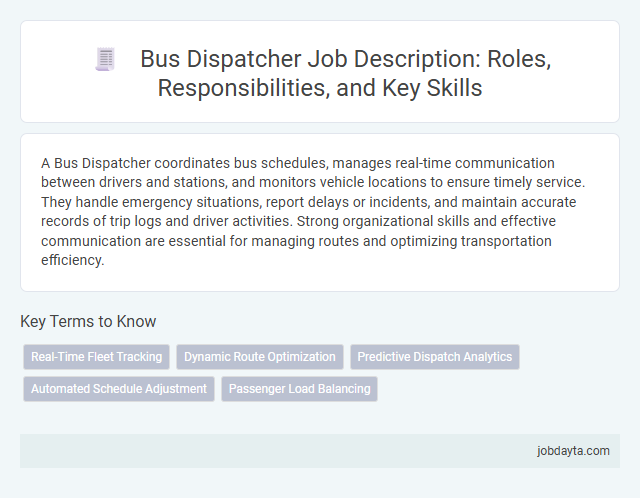A Bus Dispatcher coordinates bus schedules, manages real-time communication between drivers and stations, and monitors vehicle locations to ensure timely service. They handle emergency situations, report delays or incidents, and maintain accurate records of trip logs and driver activities. Strong organizational skills and effective communication are essential for managing routes and optimizing transportation efficiency.
Overview of a Bus Dispatcher Role
| Overview of a Bus Dispatcher Role | |
|---|---|
| Position | Bus Dispatcher |
| Primary Responsibility | Coordinate and manage bus schedules to ensure timely departures and arrivals |
| Key Tasks |
|
| Essential Skills |
|
| Impact | Your role as a Bus Dispatcher ensures efficient transportation operations, improved passenger satisfaction, and enhanced safety on the road. |
Key Responsibilities of a Bus Dispatcher
A Bus Dispatcher coordinates daily bus operations to ensure timely departures and arrivals. They manage communication between drivers, maintenance crews, and central management.
Dispatchers monitor real-time traffic and road conditions to adjust schedules proactively. They handle emergencies, rerouting buses to maintain service continuity and passenger safety.
Essential Skills Required for Bus Dispatchers
Bus dispatchers coordinate routes and schedules to ensure efficient public transportation services. They act as the communication hub between drivers, passengers, and management to resolve any operational issues.
Strong organizational skills are essential to manage multiple routes and time-sensitive schedules effectively. Excellent communication abilities enable clear instructions and quick problem-solving during service disruptions. Familiarity with geographic information systems and dispatch software improves route planning and real-time coordination.
Daily Tasks and Workflow of a Bus Dispatcher
A bus dispatcher plays a crucial role in managing the daily operations of bus transportation services. They coordinate schedules, communicate with drivers, and ensure the smooth flow of transit routes.
- Monitor Bus Locations - Use GPS tracking systems to oversee the real-time positions of buses to maintain schedule adherence.
- Communicate with Drivers - Provide drivers with updates about route changes, traffic conditions, and emergencies to ensure safety and efficiency.
- Manage Scheduling - Adjust departure times and allocate buses to routes based on passenger demand and operational needs.
Effective bus dispatching enhances public transportation reliability and passenger satisfaction.
Importance of Communication in Bus Dispatching
Effective communication is crucial in bus dispatching to ensure the timely coordination of routes and schedules. Clear instructions help prevent delays and enhance passenger safety throughout the transit system.
Bus dispatchers rely on real-time communication tools to manage fleet operations and respond promptly to emergencies. Consistent information flow between dispatchers and drivers improves overall service reliability and customer satisfaction.
Bus Dispatcher’s Role in Ensuring Passenger Safety
The bus dispatcher plays a crucial role in coordinating bus schedules to minimize delays and overcrowding, directly impacting passenger safety. By communicating real-time updates and managing driver assignments, dispatchers ensure prompt responses to emergencies and route deviations. Their vigilance in monitoring traffic conditions and vehicle statuses helps prevent accidents and enhances overall safety for passengers.
Coordination Between Bus Drivers and Management
How does a bus dispatcher ensure smooth coordination between bus drivers and management? A bus dispatcher acts as the central communication hub, relaying real-time information to drivers and management. This role is critical for maintaining schedules, managing route changes, and handling emergencies efficiently to keep bus operations running smoothly.
Challenges Faced by Bus Dispatchers
Bus dispatchers play a critical role in managing daily transit operations, yet they face significant challenges that impact service efficiency. These challenges demand quick decision-making and effective communication to maintain smooth transportation flow.
- Real-Time Traffic Management - Bus dispatchers must constantly monitor and adjust routes to avoid delays caused by traffic congestion and accidents.
- Coordination During Emergencies - Dispatchers handle unforeseen incidents like vehicle breakdowns or severe weather, requiring immediate rerouting and passenger communication.
- Balancing Schedules and Passenger Demand - Ensuring buses run on time while accommodating fluctuating passenger volumes presents ongoing logistical difficulties.
Technological Tools Used by Bus Dispatchers
Bus dispatchers utilize advanced technological tools to manage fleet operations efficiently. These tools enhance communication, scheduling, and real-time tracking of buses.
- GPS Tracking Systems - Enable dispatchers to monitor bus locations in real-time to optimize routes and improve punctuality.
- Automated Scheduling Software - Helps create and adjust bus schedules dynamically, reducing delays and increasing operational efficiency.
- Communication Platforms - Facilitate instant messaging between dispatchers and drivers for quick response to traffic conditions and emergencies.
Career Path and Advancement Opportunities for Bus Dispatchers
Bus dispatchers coordinate bus schedules, manage driver assignments, and ensure efficient route operations. Career advancement often leads to roles such as transportation supervisor, operations manager, or transit coordinator. Gaining experience and additional certifications in logistics or transportation management enhances promotion prospects in the transit industry.
Related Important Terms
Real-Time Fleet Tracking
Bus dispatchers utilize real-time fleet tracking technology to monitor vehicle locations, optimize routes, and improve schedule adherence. This system enhances operational efficiency by providing instant updates on traffic conditions and bus statuses, enabling swift response to delays or emergencies.
Dynamic Route Optimization
Bus dispatchers utilize dynamic route optimization to adjust routes in real-time based on traffic conditions, passenger demand, and road incidents, ensuring efficient and timely service. This advanced approach reduces fuel consumption, minimizes delays, and improves overall operational efficiency in public transportation systems.
Predictive Dispatch Analytics
Predictive dispatch analytics leverages historical data and real-time information to optimize bus scheduling, reduce wait times, and improve route efficiency. Bus dispatchers utilize machine learning algorithms to forecast passenger demand, enabling dynamic resource allocation and minimizing operational costs.
Automated Schedule Adjustment
Bus dispatchers utilize automated schedule adjustment systems to optimize route efficiency and reduce delays, leveraging real-time traffic data and passenger demand forecasts. These intelligent algorithms enhance operational flexibility by dynamically reallocating resources and updating timetables to maintain consistent service levels.
Passenger Load Balancing
Bus dispatchers play a critical role in passenger load balancing by monitoring real-time ridership data and adjusting bus intervals to prevent overcrowding and underutilization. Efficient load balancing enhances passenger comfort, reduces wait times, and optimizes fleet deployment across high-demand routes.
Bus Dispatcher Infographic

 jobdayta.com
jobdayta.com